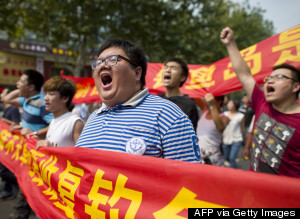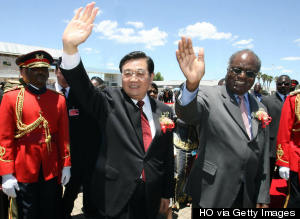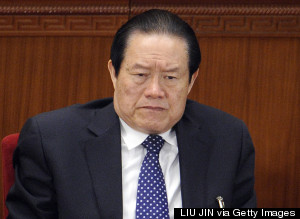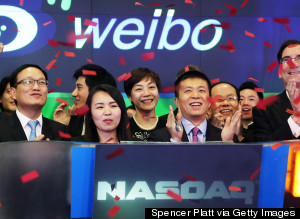Eric X. Li is a venture capitalist, political scientist and frequent commentator on China's growing economic and military influence. In a provocative TED Talk and several articles he has predicted that while China will continue to grow its wealth and power, it's unlikely to depart from one-party governance or take an evangelical approach to extending its values beyond Chinese borders. While in San Francisco for a conference, Li sat down with The WorldPost's Matt Sheehan for a conversation about China's growing territorial assertiveness, the transforming international order, and the future of China's political system.
With Obama's recent trip to Japan and the rhetoric on conflicts in places like Ukraine, it seems that the U.S. is attempting to reassure allies that it will be there for them in case of conflict. Do you think these assurances carry much weight after what's happened in Syria and Crimea?

I really don't know. I think that American politicians have a tendency to make promises for the sake of expediency that they can't possibly keep. It's the norm for domestic politics during elections, but it's also increasingly the case in international relations. This reminds me of George Kennan, the great architect of America's containment policy during the Cold War. When NATO was expanding eastward along with the EU after the end of the Cold War, he said it was a grave mistake. The U.S. was just lightheartedly issuing security guarantees to protect many nations that it had no real desire or intent or ability to truly meaningfully fulfill. I think his prediction is becoming reality. Where is George Kennan when you need him? Has what's happened in places like Crimea changed the calculus of what Chinese leaders think is possible in the Asia Pacific? Has it changed how far they think they can push these conflicts?
I think only on the margin. It's a secondary trend, whether Crimea happens or not. The more decisive trend is occurring in America. I mean, the United States has 4.5 percent of the world's population, less than 20 percent of its production, but accounts for half of the whole world's defense spending. It is constantly at war in distant lands. In a little more than a generation's time after winning the Cold War, it has become deeply in debt, its industry is hollowed out, its middle class is collapsing, its infrastructure is badly in disrepair, its education is under-funded, and its social contract is in shambles. It is not sustainable; it simply can't go on forever. American foreign policy is "pivoting" to Asia, then to the Middle East, then to Ukraine, while the American people badly need a pivot to Ohio. And that is the context within which China seems to be considering its strategic options in the very long term.
When discussing the emerging relationship between the U.S. and China, you've talked about managed competition, strategic cooperation and respect for spheres of influence. In that context, what role does the U.S. have to play in the Asia Pacific?
The United States has protectorates in the Asia Pacific region that are in conflict with China, Japan being the biggest and the Philippines as well. The question is whether we're going toward a future in which China will justifiably be able to establish a legitimate sphere of influence in this neighborhood in an orderly fashion. It's a large country with a long history, and we'll see if it can fulfill its destiny as a pre-eminent power in the Asia Pacific in a peaceful manner and what will the United States' role be in this process. That is the question.

You've argued that the Chinese Communist Party derives its legitimacy from economic progress and the nationalist legitimacy of liberating China after the 'century of humiliation' at the hands of foreign powers. In a potential territorial showdown with Japan, Chinese leaders may have to choose between a military clash that is highly disruptive to the economy, or appearing to give ground on core nationalist interests. If so, how do you see the party choosing to move forward?
In that case, the two sources of legitimacy are in conflict and the Chinese leadership has just got to manage this. This is a delicate balance that they have to get, and I think they've done reasonably well so far. If managed well, in the long term, the two goals are mutually supportive of each other.
I don't buy the argument that China has hurt itself in its more assertive policies in the South and East China Sea. I think they've performed brilliantly. The strategy was to change the status quo in China's favor without leading to actual military conflict, and in territorial disputes with the Philippines and Japan they've done that. For the islands disputed with the Philippines, China now effectively controls the space and there has been no war. In the Diaoyu Islands, China has been able to create new realities on the ground. Japan's long held position has been the denial of dispute. They continue to deny there is a dispute, but dispute is now a fact. China's patrol boats are there frequently. China has changed the status quo qualitatively, and there's been no war.
At the same time, you've described unanticipated military conflict as the greatest threat to China's development. If that's the case, can recent moves that have changed the status quo but also ratcheted up tensions and the likelihood of conflict really be called a success for China?
Success does not come out of being paralyzed by seemingly conflicting objectives. Economic development helped by a peaceful external environment is a critical strategic objective for China, but so is a multifaceted renaissance of the Chinese nation that includes reclaiming a leadership position in the Asia Pacific that would enable China to protect its core interests. These goals cannot be achieved without taking risks. I think the Chinese strategy is to take calculated risks but control risks in order to obtain optimal outcomes.

You argue that the U.S. is no longer able to fill the Leviathan role of policing an international order that it has created. You also say that despite China's ascendancy, it will not try to fill this role of regulating an international architecture. Given China's increasing economic entanglement everywhere from Africa to South America, can China maintain its aloofness on foreign policy issues?
I think certainly China is going to be more internationally involved. It has more outward-looking political and economic policies everywhere from Africa to Southeast Asia. But the fundamental outlook is different. They're not trying to build an overarching system where they're the hegemon. They're trying to do what's best for the Chinese people, and they treat the other participants as independent players. They're not going to try to force their ideas on others or tell others how to run their countries or sign them up to some kind of grand scheme. The Chinese are there to trade and cut the best deals for their own people. Of course they will be more assertive but it's fundamentally different from the American worldview.
You've expressed high confidence in the ability of China's bureaucracy to deal with the many issues that China faces today. Looking at the vast array of challenges, from environmental degradation to corruption to financial and economic hurdles, which issues worry you the most? Are there problems that you think the Chinese Communist Party is not ready or able to handle?

The two front-burner items are economics and corruption. The current economic structure has served China well in the past but will no longer be sustainable in the future, so they're going to need to make structural changes to the economy. But in order to make those structural changes they're going to need to slow down the growth rate, which could cause other problems. So getting that balance right is really hard, I think. But they have a very, very competent team and I think they'll be able to lick it.
The second problem is corruption ... Corruption has been a problem for China for thousands of years; every dynasty has had enormous corruption problems. So the root causes are complex and deep, and it's very difficult to address permanently. Right now the policy is a campaign-style anti-corruption drive: you hit 'em hard and it'll get better for some time and then eventually it will come back and another hit will be required. Right now we're in the early stages of a tough anti-corruption drive, probably the toughest in the history of the People's Republic. I think it'll succeed for some time and it'll contain corruption but won't eliminate it. Other longer-term reforms are also taking place that will see an increasing role of a rule-based institutional system in China's governance, but that is a gradual process.
We're now a year and a half into Xi Jinping's leadership. How do you rate Xi on vision and execution, and what are the real sticking points and toughest nuts to crack?
I characterize the Xi leadership as the beginning of the third 30-year period for the People's Republic, so needless to say I think it's really important. The first 30 years were the Mao era, the second 30 years were the Deng era. In many respects both Jiang Zemin and Hu Jintao were extensions of the Deng era. I think Xi opens a new era that dialectically synthesizes the previous two. In terms of the vision that he has articulated to the Chinese people, where he wants to take the country, and what he's been able to execute in the last 18 months, it has been beyond anyone's imagination or expectations. Economic reforms, anti-corruption, political reforms, everything.
Things have mostly gone well for the Xi leadership so far, but where do the toughest aspects of reform lie?
In my view the biggest risk is an unanticipated international conflict. I think they're going to lick the economics. I know a lot of people are emphasizing the risks, and I agree there are risks but I think they're going to get it right. The economy is moving toward a new phase and it's highly innovative.
I don't know what people are talking about when they say innovation is China's problem. I think China is going through the most innovative period in hundreds of years. When I started as a venture capitalist 18 or 19 years ago, I was told that China could never produce a tech company with a $1 billion market cap. Today Ali Baba and Tencent each are over $100 billion. A $1 billion company? You go into a restaurant in Beijing's university district and there are ten of them.

Many of China's biggest international tech companies are essentially shielded from competition at home. If China wants to produce more companies that compete internationally, say WeChat with WhatsApp, what role (if any) will the Chinese Communist Party play in that?
I think the party's role is not in directly helping these companies. The party's role is more fundamental: attracting people, attracting investment. If you look at universities in China, they are unrecognizable from 10 years ago in terms of the laboratories they've built and the people they've been able to attract. I think they're setting the stage for a sustained period of young talent coming up and being able to create new technologies, new ways of doing things. I'm optimistic on that front.
You've argued against the assumption that with rising incomes will come rising demand for political rights and freedom of expression in China. If this kind of political expression doesn't occur, do you see another kind of political consciousness filling the void, increased nationalism for example?
Just go on any Chinese Internet portal, Weibo, YY, WeChat, for example, and the Chinese people are expressing themselves all day long. I think that this presumption in the West that they'll seek political rights is a pre-supposed problem that didn't exist.
In describing Chinese people, I hesitate to use the term middle class because it's a loaded term. Middle class means bourgeoisie. The bourgeoisie was a unique European phenomenon. The bourgeoisie was more than money, the bourgeoisie already had politics and religion in its DNA before their economic success. Money enabled them to act on those aspirations. It goes back to the Protestant Reformation and the Enlightenment. The bourgeoisie emerged with political and religious elements in its DNA and economics was part of it. China does not have a bourgeois class, it has a middle-income group that is rapidly expanding. In contrast, the European bourgeois class wanted political and religious rights to begin with, with or without money.
The idea that people start buying refrigerators and cars, and then the next thing is they want elections, that's crazy. It has no basis in history or political science; it's made up.
This interview has been edited for length and clarity.
